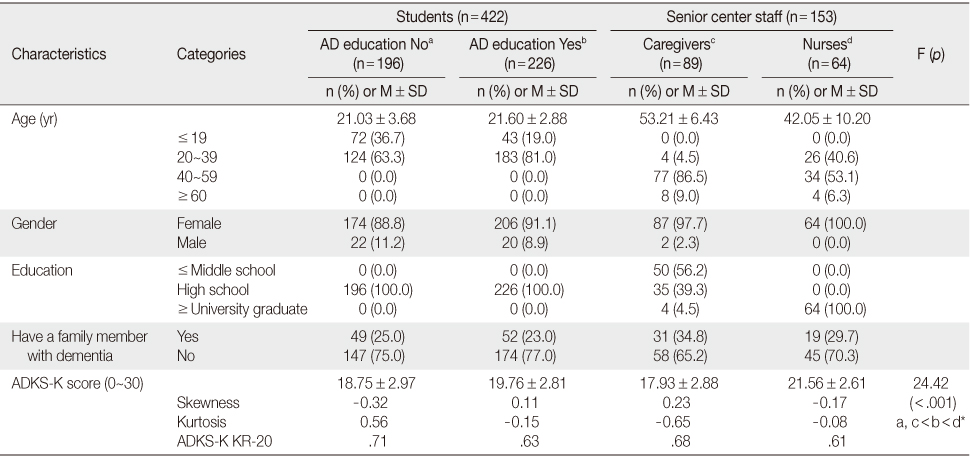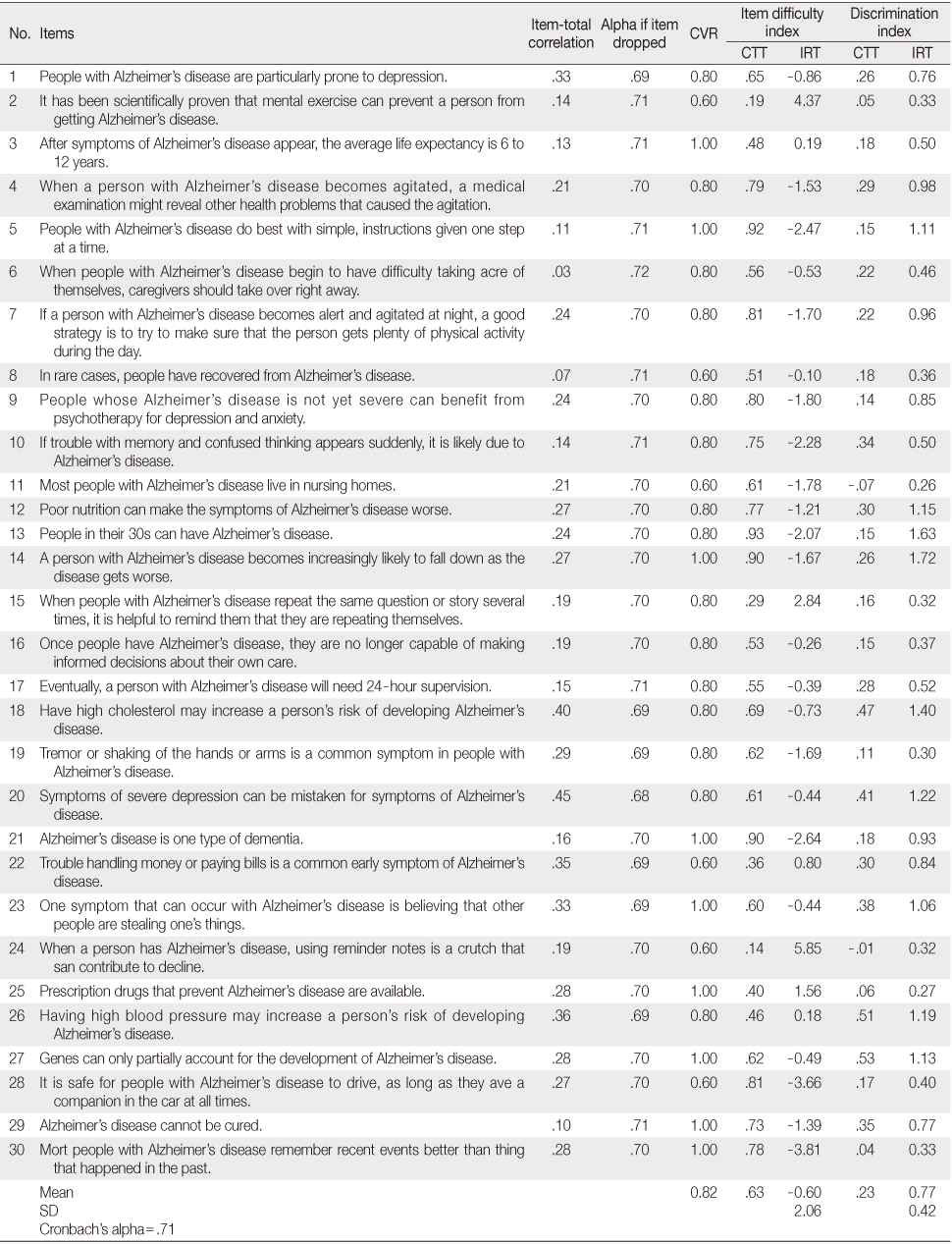Articles
- Page Path
- HOME > J Korean Acad Nurs > Volume 45(1); 2015 > Article
-
Original Article
- Psychometric Properties of the Alzheimer's Disease Knowledge Scale-Korean Version
- Eun Joo Kim, Ji-young Jung
-
Journal of Korean Academy of Nursing 2015;45(1):107-117.
DOI: https://doi.org/10.4040/jkan.2015.45.1.107
Published online: February 27, 2015
1Department of Nursing, Daejeon University, Daejeon, Korea.
2Department of Nursing, Wonkwang Health Science University, Iksan, Korea.
- Address reprint requests to: Jung, Ji-young. Department of Nursing, Wonkwang Health Science University, 514 Iksan-daero, Iksan 570-750, Korea. Tel: +82-63-840-1318, Fax: +82-63-840-1319, jio110@wu.ac.kr
© 2015 Korean Society of Nursing Science
This is an Open Access article distributed under the terms of the Creative Commons Attribution NoDerivs License. (http://creativecommons.org/licenses/by-nd/4.0/) If the original work is properly cited and retained without any modification or reproduction, it can be used and re-distributed in any format and medium.
Abstract
-
Purpose
- The purpose of this study was to evaluate the psychometric properties of the Korean version of the Alzheimer's Disease Knowledge Scale (ADKS-K) to determine its applicability to Korean adults.
-
Methods
- Cross-cultural validity was performed according to Consensus-based Standards for the Selection of Health Measurement Instruments (COSMIN). The Kuder-Richardson Formula 20 for internal consistency and Intraclass Correlation Coefficient (ICC) for test-retest reliability were conducted. Content validity, criterion related validity and construct validity were evaluated. The Classical Test Theory (CTT) model and the Item Response Theory (IRT) model were applied in performing the item analysis.
-
Results
- The KR 20 was .71, and the ICC was .90, indicating that the ADKS-K has internal consistency and stability reliability. Thirty items of the ADKS-K had significant Content Validity Ratio (CVR) values, i.e., mean of 0.82 and range of 0.60~1.00. Mean item difficulty and discrimination indices calculated by TestAn program were 0.63 and 0.23, respectively. Mean item difficulty and discrimination indices calculated by BayesiAn program were -0.60 and 0.77, respectively. These tests indicate that ADKS-K has an acceptable level of difficulty and discriminating efficiency.
-
Conclusion
- Results suggest that ADKS-K has the potential to be a proper instrument for assessing AD knowledge in Korean adults.
- 1. Ministry of Health & Welfare. Nine point one eight prevalence of dementia in 2012, each 2-fold increase in 20 years with dementia can [Internet]. Sejong, Author. 2013;cited 2014 July 30. Available from: http://www.mw.go.kr/front_new/al/sal0301vw.jsp?PAR_MENU_ID=04&MENU_ID=0403&CONT_SEQ=286138&page=1
- 2. Alzheimer's Association. 2011 Alzheimer' disease facts and figures. Alzheimers Dement. 2011;7(2):208–244. PubMed
- 3. Go SM, Lee KS, Seo SW, Chin J, Kang SJ, Moon SY, et al. Survival of Alzheimer's disease patients in Korea. Dement Geriatr Cogn Disord. 2013;35(3-4):219–228. ArticlePubMedPDF
- 4. Jorm AF, Korten AE, Jacomb PA, Christensen H, Rodgers B, Pollitt P. "Mental health literacy": A survey of the public's ability to recognise mental disorders and their beliefs about the effectiveness of treatment. Med J Aust. 1997;166(4):182–186.ArticlePubMedPDF
- 5. Carpenter BD, Balsis S, Otilingam PG, Hanson PK, Gatz M. The Alzheimer's disease knowledge scale: Development and psychometric properties. Gerontologist. 2009;49(2):236–247. ArticlePubMedPMC
- 6. Jang Y, Kim G, Chiriboga D. Knowledge of Alzheimer's disease, feelings of shame, and awareness of services among Korean American elders. J Aging Health. 2010;22(4):419–433. ArticlePubMedPMCPDF
- 7. Wang JJ, Hsieh PF, Wang CJ. Long-term care nurses' communication difficulties with people living with dementia in Taiwan. Asian Nurs Res. 2013;7(3):99–103. Article
- 8. Kim NC. A study on the knowledge and attitude about senile dementia of the elderly. J Korea Community Health Nurs Acad Soc. 1999;13(2):1–11.
- 9. Cho HO. A study on public's knowledge of and attitude towards dementia [master's thesis]. Seoul, Hanyang University. 1999.
- 10. Hwang E, Kim B, Kim H. A study on dementia-related knowledge and attitudes in adolescents. Korean J Rehabil Nurs. 2013;16(2):133–140.Article
- 11. Ko SJ, Shin SH. Effects of dementia knowledge, self-efficacy and depression on dementia preventive behavior in elderly couples: Dyadic data analysis. J Korean Acad Nurs. 2013;43(2):276–286. ArticlePubMed
- 12. Spector A, Orrell M, Schepers A, Shanahan N. A systematic review of 'knowledge of dementia' outcome measures. Ageing Res Rev. 2012;11(1):67–77. ArticlePubMed
- 13. Dieckmann L, Zarit SH, Zarit JM, Gatz M. The Alzheimer's disease knowledge test. Gerontologist. 1988;28(3):402–407.ArticlePubMed
- 14. Barrett JJ, Haley WE, Harrell LE, Powers RE. Knowledge about Alzheimer disease among primary care physicians, psychologists, nurses, and social workers. Alzheimer Dis Assoc Disord. 1997;11(2):99–106.ArticlePubMed
- 15. Gilleard C, Groom F. A study of two dementia quizzes. Br J Clin Psychol. 1994;33(Pt 4):529–534.ArticlePubMed
- 16. Kuhn D, King SP, Fulton BR. Development of the knowledge about memory loss and care (KAML-C) test. Am J Alzheimers Dis Other Demen. 2005;20(1):41–49.ArticlePubMedPMCPDF
- 17. Cooke DD, McNally L, Mulligan KT, Harrison MJ, Newman SP. Psychosocial interventions for caregivers of people with dementia: A systematic review. Aging Ment Health. 2001;5(2):120–135. ArticlePubMed
- 18. Lee EO, Im NY, Park HA, Lee IS, Kim JI, Bae JI, et al. Nursing research and statistical analysis. Paju: Soomoonsa; 2009.
- 19. Williams B, Brown T, Onsman A. Exploratory factor analysis: A five-step guide for novices. Aust J Paramed. 2012;8(3):1–13.ArticlePDF
- 20. Reise SP, Ainsworth AT, Haviland MG. Item response theory: Fundamentals, applications, and promise in psychological research. Curr Dir Psychol Sci. 2005;14(2):95–101.ArticlePDF
- 21. Cangelosi JS. Designing tests for evaluating student achievement. New York, NY: Longman Publishing Group; 1990.
- 22. Seong TJ. Understanding and application of item response theory. Paju: Kyoyookbook; 2001.
- 23. Ebel RL. Measuring educational achievement. Englewood Cliffs, NJ: Prentice-Hall; 1965.
- 24. Kang H. A guide on the use of factor analysis in the assessment of construct validity. J Korean Acad Nurs. 2013;43(5):587–594. ArticlePubMed
- 25. Kim MS, Kwon KJ, Kim JA, Kim JH, Kim HJ, Rho HK, et al. Nursing research methodology. Seoul: Jungdam Media; 2011.
- 26. Landis JR, Koch GG. The measurement of observer agreement for categorical data. Biometrics. 1977;33(1):159–174.ArticlePubMed
- 27. Lawshe CH. A quantitative approach to content validity. Pers Psychol. 1975;28(4):563–575.
- 28. Shipley WC. A self-administering scale for measuring intellectual impairment and deterioration. J Psychol. 1940;9(2):371–377. Article
- 29. Nordhus IH, Sivertsen B, Pallesen S. Knowledge about Alzheimer's disease among Norwegian psychologists: The Alzheimer's disease knowledge scale. Aging Ment Health. 2012;16(4):521–528. ArticlePubMed
REFERENCES
Figure & Data
REFERENCES
Citations

- Expanding the health belief model on dementia knowledge, fear, and preventive behaviors among older adults in Korea: a cross-sectional descriptive study
Jeong Eui Yun, Suyoung Choi
Journal of Korean Biological Nursing Science.2025; 27(1): 60. CrossRef - Psychometric evaluation of the Alzheimer's Disease Knowledge Scale in Ecuadorian university students
José Alejandro Valdevila Figueira, Andrés Ramírez, María Alejandra Espinosa de los Monteros, Rocío Valdevila Santiesteban, Indira Dayana Carvajal Parra, Lilia Romero-Sacoto, María José Pico Cucalón
Journal of Alzheimer's Disease Reports.2025;[Epub] CrossRef - The Mediating Role of Attitudes Towards Dementia on the Relationship Between Dementia Knowledge and Behaviors Towards Persons with Dementia: A Cross-Sectional Study
Yang-Tzu Li, Jing-Xuan Bai, Jia-Ming He, Shao-Wei Yang, Hsiu-Li Huang
Journal of Multidisciplinary Healthcare.2023; Volume 16: 4213. CrossRef - Alzheimer’s disease (AD) knowledge in Korean Americans: identifying knowledge gaps and misconceptions and examining predictors of AD knowledge
Sang E. Lee, Michin Hong, Banghwa L. Casado
Ethnicity & Health.2023; 28(3): 431. CrossRef - Validity and Reliability of the Korean Version of Assessment of Health Literacy in Breast and Cervical Cancer Screening
Hye Sook Shin, Eunlim Chi, Hae-Ra Han
Journal of Korean Academy of Nursing.2021; 51(6): 769. CrossRef - Quantifying Knowledge of Alzheimer’s Disease: An Analysis of the Psychometric Properties of the Alzheimer’s Disease Knowledge Scale
Guillermo Garcia-Ribas, Elena García-Arcelay, Alonso Montoya, Jorge Maurino, Javier Ballesteros
Neurology and Therapy.2021; 10(1): 213. CrossRef - The Impact of Dementia Knowledge and Attitude on Caregiving Appraisal among Caregivers of Older Adults with Dementia Using Dementia Care Centers
Ji Yeon Hong, Dukyoo Jung
Journal of Korean Gerontological Nursing.2020; 22(4): 348. CrossRef - Development of Knowledge and Attitudes Survey on Pain Management for Korean Long-term Care Professionals
So-Hi Kwon, Hyunsim Kim, Seurk Park, Wooseok Jeon
Asian Nursing Research.2020; 14(2): 105. CrossRef - Reliability and Validity of the Korean version of the Pain in Older Adults Knowledge Survey (K-POAKS) among Nurses Who Have Worked in Long-term Care Hospitals
Young Seun Ryu, Jeong Sook Park
Journal of Korean Academy of Community Health Nursing.2020; 31(2): 130. CrossRef - Validation of the Spanish Version of the Dementia Knowledge Assessment Tool 2
Laura Parra-Anguita, Sara Moreno-Cámara, María Dolores López-Franco, Pedro L. Pancorbo-Hidalgo, Alden Gross
Journal of Alzheimer’s Disease.2018; 65(4): 1175. CrossRef - Knowledge and Attitudes in Alzheimer’s Disease in a Cohort of Older African Americans and Caucasians
J. Christina Howell, Oretunlewa Soyinka, Monica Parker, Thomas L. Jarrett, David L. Roberts, Cornelya D. Dorbin, William T. Hu
American Journal of Alzheimer's Disease & Other Dementias®.2016; 31(4): 361. CrossRef - Knowledge about dementia in South Korean nursing students: a cross-sectional survey
Jung Ha Shin, Hyun-Ju Seo, Kye Ha Kim, Kyoung-Hoon Kim, Youngjin Lee
BMC Nursing.2015;[Epub] CrossRef
General Characteristics and ADKS-K Score (N=575)
*Scheffé post Hoc test; ADKS-K=Alzheimer's Disease Knowledge Scale-Korean; KR-20=Kuder-Richardson Formula 20; AD=Alzheimer's Disease
Pearson Correlation Coefficient and Intraclass Correlation Coefficient for Test-retest (N=40)
ICC=Intra correlation coefficient; CI=Confidence interval.
Pearson Correlation Coefficient between Dementia Score and K-ADKS Score (N=575)
ADKS-K=Alzheimer's Disease Knowledge Scale-Korean.
Individual Item Properties Using Classic Test Theory and Item Response Theory and Content Validity Index
CVR=Content validity ratio; CTT=Classic test theory; IRT=Item response theory.
*Scheffé post Hoc test; ADKS-K=Alzheimer's Disease Knowledge Scale-Korean; KR-20=Kuder-Richardson Formula 20; AD=Alzheimer's Disease
ICC=Intra correlation coefficient; CI=Confidence interval.
ADKS-K=Alzheimer's Disease Knowledge Scale-Korean.
CVR=Content validity ratio; CTT=Classic test theory; IRT=Item response theory.
 KSNS
KSNS
 E-SUBMISSION
E-SUBMISSION




 Cite
Cite

